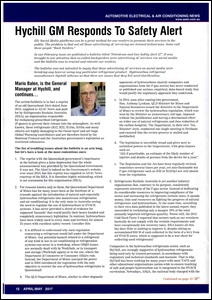AAEN: HyChill GM Responds to safety alert
Petroleum and Gas Safety Alert 57 – Automotive Electrical & Air Conditioning News
Hydrocarbon refrigerants are ‘natural’, supremely efficient refrigerant of choice, widely used in a variety of applications, ranging from domestic fridges and freezers to automotive AC and commercial and industrial refrigeration.
The February edition of the AAEN published an article titled “Petroleum and Gas Safety Alert 57”. The article is in fact a reprint of an old Queensland Alert dated June 2013, paid for by the Refrigerants Reclaim Australia (RRA), an organisation responsible for reclaiming proscribed refrigerants (F-gases) to prevent their release into the atmosphere. As well known, these refrigerants (R12, R22, R134a, R410a and many others) are highly damaging to the Ozone layer and are huge Global Warming contributors and are therefore listed by the Montreal Protocol and the Australian government’s legislation as restricted substances.
The list of troubling issues about the advertisement is an arm long, but let’s have a look at the most contentious ones:
-
Nowhere in the article is the reader informed that it actually constitutes a paid advertisement/announcement on behalf of RRA. The reprint with the Queensland government’s imprimatur at the bottom gives a false impression that the whole announcement was provided by the Queensland Government. It was not. The Alert is indeed on the Government’s website ever since 2013, but this reprint comes courtesy of the RRA. It is therefore highly misleading, which is not uncommon for this organisation.
-
For reasons known only to them, the Queensland Department of Mines has for many years been at the forefront of crusade against the introduction of natural and especially hydrocarbon refrigerants into the mainstream refrigeration and air conditioning. It is the only state in Australia seeing the need to regulate the use of hydrocarbons in HVACR systems. It has never provided a shred of evidence for supposed ‘hazards’ that would justify their heavy-handed and completely unnecessary legislation. In contrast, hydrocarbons have been widely used in every state and territory for almost 25 years with excellent safety record. Consider this:
-
It is difficult to understand why such regulation concerning a refrigerant would fall under the Department of Mines. Any potential hazard related to a refrigerant of any kind in use in air conditioning or refrigeration systems can occur in a workshop, where OH&S issues are normally dealt with by WorkSafe, or in transport and storage (WorkSafe again) or in the use, where the Department of Commerce or Consumer Affairs rule. Instead, the Department of Mines usurped the power and in 2004 introduced the regulation with the only objective to restrict the use of hydrocarbon refrigerants in Queensland!
-
The QLD Department of Mines, similar to other dogmatic opponents of hydrocarbons (mainly companies and organisations from the F-gas sector) has never conducted or published any serious, empirical, data-based study that would justify the regulatory approach they undertook.
-
In 2014, soon after coming into government, Hon. Lynham, QLD Minister for Mines and Natural Resources issued the directive to the Department of Mines to review the hydrocarbon regulation, which was seen by the Minister as unnecessary red tape, imposed without the justification and having a detrimental effect on wider use of natural refrigerants and thus reduction of the carbon footprint. The Department, in their own ‘Yes, Minister’-style, conducted one single meeting in Brisbane and ensured that the review process is stalled and mothballed.
-
The legislation is incredibly broad and gives next to unlimited powers to the Inspectorate, with gem-clauses such as:
“(iii) if practicable, an estimate of the likely number of injuries and deaths of persons from the device for a year;”. -
The Regulation and the Act have been regularly revised, sometimes several times per year, yet also-flammable but F-gas refrigerants such as R32 or R1234yf are still absent from the regulation.
-
-
Refrigerants Reclaim Australia is yet another industry organisation that, contrary to its purpose, consistently represents interests of the F-gas sector. Instead of dedicating its considerable resources to improving compliance of the sector and increasing the refrigerants reclaim rates, it spends money, time and resources on fighting the progress of natural refrigerants and hydrocarbons. At the same time, according to their own data published in the latest annual report, they succeeded in reclaiming only a meagre 10% of the total annually imported refrigerant quantity. Worse still, the 2015 Cold Hard Facts 3 reported that sectors such as car wreckers basically do not comply with the reclaim requirements and have exceptionally low recovery rates. RRA knows all this but does little to nothing to improve it, despite of sitting on accumulated $50 M of cash collected in a form of a levy from all HVACR users, which is supposed to be a war chest for collecting used refrigerants!
Companies in the hydrocarbon refrigerants sector, such as HyChill, are strongly supportive of hydrocarbon refrigerants being used only by trained personnel, in accordance with regulatory and technical standards and manuals. That is why HyChill has been working for many years with most TAFE and other educational organisations nation-wide to ensure teaching of safe and proper hydrocarbon use is integrated in the HVACR curriculum. Nowadays, ASQA, the national body charged with the curriculum development has mandated teaching of hydrocarbons to all educational organisations under its auspices.
It is important to see the write-up for what it really is – a sustained effort of RRA and the QLD Department of Mines to halt the progress of hydrocarbons and protect interests of the F-gas sector. It has nothing to do with safety and is detrimental to national interests in reduction of the global warming and Ozone destruction.

HyChill Australia is the leading Australian manufacturer and supplier of hydrocarbon refrigerants, well known brands such as Minus30 and Minus 50. HyChill has consistently promoted safe and responsible use of hydrocarbon refrigerants by trained personnel in applications such as automotive air conditioning, light commercial refrigeration, domestic refrigeration and other. For more on HyChill and safe use of hydrocarbon refrigerants visit www.hychill.com.au